(完整版)情态动词表推测用法讲解及配套练习
情态动词表推测用法总结(整理稿)
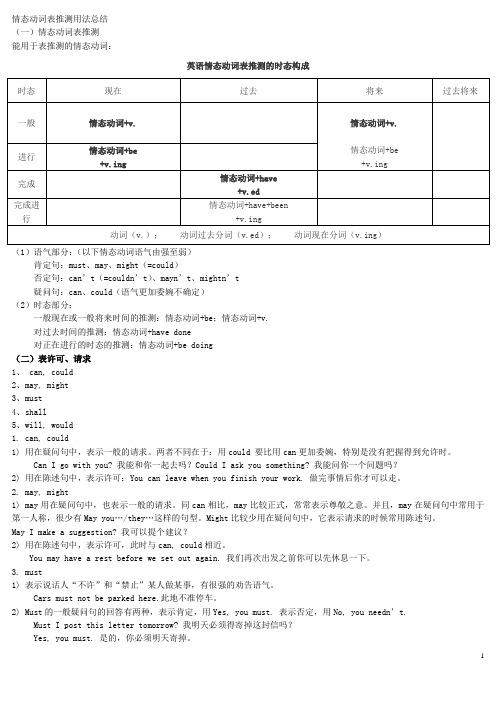
情态动词表推测用法总结(一)情态动词表推测能用于表推测的情态动词:英语情态动词表推测的时态构成(1)语气部分:(以下情态动词语气由强至弱)肯定句:must、may、might(=could)否定句:can’t(=couldn’t)、mayn’t、mightn’t疑问句:can、could(语气更加委婉不确定)(2)时态部分:一般现在或一般将来时间的推测:情态动词+be;情态动词+v.对过去时间的推测:情态动词+have done对正在进行的时态的推测:情态动词+be doing(二)表许可、请求1、 can, could2、may, might3、must4、shall5、will, would1. can, could1) 用在疑问句中,表示一般的请求。
两者不同在于:用could 要比用can更加委婉,特别是没有把握得到允许时。
Can I go with you? 我能和你一起去吗?Could I ask you something? 我能问你一个问题吗?2) 用在陈述句中,表示许可:You can leave when you finish your work. 做完事情后你才可以走。
2. may, might1) may用在疑问句中,也表示一般的请求。
同can相比,may比较正式,常常表示尊敬之意。
并且,may在疑问句中常用于第一人称,很少有May you…/they…这样的句型。
Might比较少用在疑问句中,它表示请求的时候常用陈述句。
May I make a suggestion? 我可以提个建议?2) 用在陈述句中,表示许可,此时与can, could相近。
You may have a rest before we set out again. 我们再次出发之前你可以先休息一下。
3. must1) 表示说话人“不许”和“禁止”某人做某事,有很强的劝告语气。
Cars must not be parked here.此地不准停车。
初中英语语法之表推测情态动词用法和练习
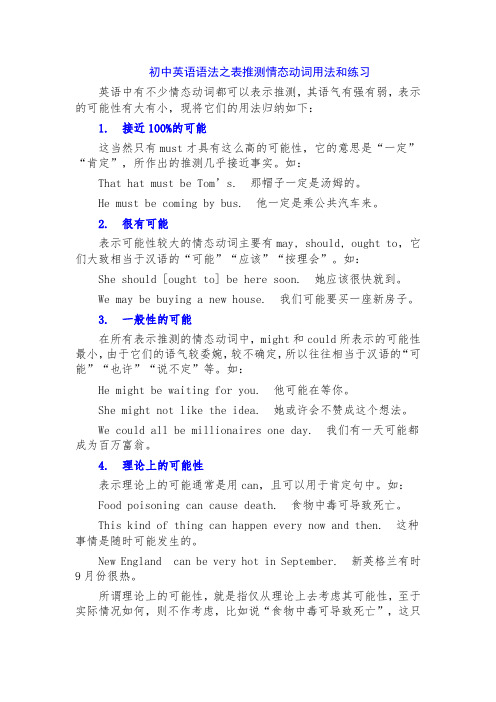
初中英语语法之表推测情态动词用法和练习英语中有不少情态动词都可以表示推测,其语气有强有弱,表示的可能性有大有小,现将它们的用法归纳如下:1. 接近100%的可能这当然只有must才具有这么高的可能性,它的意思是“一定”“肯定”,所作出的推测几乎接近事实。
如:That hat must be Tom’s. 那帽子一定是汤姆的。
He must be coming by bus. 他一定是乘公共汽车来。
2. 很有可能表示可能性较大的情态动词主要有may, should, ought to,它们大致相当于汉语的“可能”“应该”“按理会”。
如:She should [ought to] be here soon. 她应该很快就到。
We may be buying a new house. 我们可能要买一座新房子。
3. 一般性的可能在所有表示推测的情态动词中,might和could所表示的可能性最小,由于它们的语气较委婉,较不确定,所以往往相当于汉语的“可能”“也许”“说不定”等。
如:He might be waiting for you. 他可能在等你。
She might not like the idea. 她或许会不赞成这个想法。
We could all be millionaires one day. 我们有一天可能都成为百万富翁。
4. 理论上的可能性表示理论上的可能通常是用can,且可以用于肯定句中。
如:Food poisoning can cause death. 食物中毒可导致死亡。
This kind of thing can happen every now and then. 这种事情是随时可能发生的。
New England can be very hot in September. 新英格兰有时9月份很热。
所谓理论上的可能性,就是指仅从理论上去考虑其可能性,至于实际情况如何,则不作考虑,比如说“食物中毒可导致死亡”,这只是理论上的一种推断,至于某人某次食物中毒了,他是否会死亡,则不在考虑之列,所以说,这种推测是非常“宏观”的!5. 表示对过去情况作推测如果表示对已经发生的情况作推测,不能用“情态动词+动词原形”,也不能用“情态动词的过去式+动词原形”,而是要使用“情态动词+动词完成式”。
(完整word版)初中英语情态动词详细用法归纳(含练习及答案)(直接打印版),推荐文档
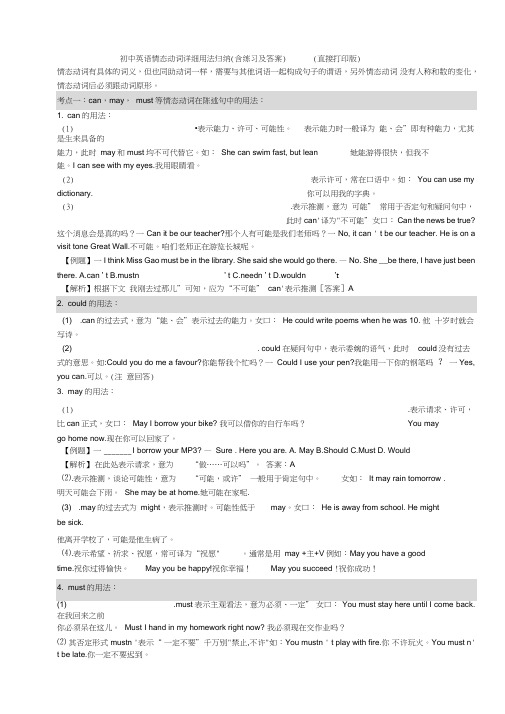
初中英语情态动词详细用法归纳(含练习及答案) (直接打印版)情态动词有具体的词义,但也同助动词一样,需要与其他词语一起构成句子的谓语,另外情态动词没有人称和数的变化,情态动词后必须跟动词原形。
1. can的用法:(1)•表示能力、许可、可能性。
表示能力时一般译为能、会”即有种能力,尤其是生来具备的能力,此时may和must均不可代替它。
如:She can swim fast, but lean 她能游得很快,但我不能。
I can see with my eyes.我用眼睛看。
(2)表示许可,常在口语中。
如:You can use my dictionary. 你可以用我的字典。
(3).表示推测,意为可能” 常用于否定句和疑问句中,此时can'译为"不可能”女口:Can the news be true?这个消息会是真的吗?一Can it be our teacher?那个人有可能是我们老师吗?一No, it can ' t be our teacher. He is on a visit tone Great Wall.不可能。
咱们老师正在游览长城呢。
【例题】一I think Miss Gao must be in the library. She said she would go there. —No. She __be there, I have just beenthere. A.can ' t B.mustn ' t C.needn ' t D.wouldn 't【解析】根据下文我刚去过那儿”可知,应为“不可能” can'表示推测[答案]A(1) .can的过去式,意为“能、会”表示过去的能力。
女口:He could write poems when he was 10. 他十岁时就会写诗。
(2) . could在疑问句中,表示委婉的语气,此时could没有过去式的意思。
情态动词表推测用法讲解及配套练习
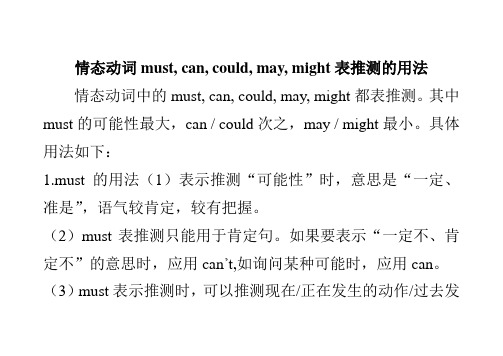
情态动词must, can, could, may, might表推测的用法情态动词中的must, can, could, may, might都表推测。
其中must的可能性最大,can / could次之,may / might最小。
具体用法如下:1.must的用法(1)表示推测“可能性”时,意思是“一定、准是”,语气较肯定,较有把握。
(2)must表推测只能用于肯定句。
如果要表示“一定不、肯定不”的意思时,应用can’t,如询问某种可能时,应用can。
(3)must表示推测时,可以推测现在/正在发生的动作/过去发生的动作。
(4)在反意疑问句中,当附属部分含有表示推测意义的must 时,疑问部分的助动词应与must后面的动词在非推测情况下的用法保持一致。
2.?can / could的用法(1)can表示推测“可能性”时,往往用于否定句或疑问句。
Can’t“一定不”,语气很肯定。
can在疑问句中意思是“会、可能”。
(2)can /can’t后可接进行时/完成时,表示对现在发生的动作或过去发生的动作进行推测。
(3)在反意疑问句中,当陈述部分含有表示推测意义的can’t 时,疑问部分的助动词应与can’t后面的动词在非推测情况下的用法保持一致.(4)could可用于表示某事有可能发生或可能是事实。
(5)could还可以用于表示客气、委婉、礼貌的请求语气。
(6)couldn’t表示否定推测,表示某事不可能真实,或由于特定事实或环境某事肯定不会发生。
3. may和might的用法(1)may, might表示推测“可能性”时,意思是“可能”、“也许”,语气没有must肯定。
(2)may, might表推测时,可以用于否定句,意思是“可能不、也许不”,但不用于疑问句。
(3)may, might可以推测现在正在发生的动作或过去发生的动作。
(4)may, might还可以推测将来的情况。
一、单项选择1 John___ come to see us tonight, but he isn't very sure yet.A. mayB. needC. can’tD. must2 John isn’t in the classroom. He play soccer on the playground with Bob.A. canB. mustC. shouldD. can’t3 -Will you go to the cinema with us?-No, I rather read a magazine at home.A. shouldB. mightC. wouldD. had better4 You___ go and see a doctor at once because you got a fever.A. canB. mustC. dareD. would5 -Can you speak Japanese? -No, I____.A. mustn'tB. can'tC. needn'tD. may not6 -He___ be in the classroom, I think.-No, he ___ be in the classroom. I saw him go home a minute ago.A.can; may notB. must; may notC. may; can'tD. may;mustn't7 -Is Lena swimming in the pool?-No, she swim. She is terrified of water.A. may notB. must notC. can'tD. needn't8 He isn't at school. I think he ___ be ill.A. canB. shallC. mustD. might9 -What do you think “upset” means?- I’m not sure. It mean “sad”.A may B. must C. canD. should10 The children___ play football on the road.A. can'tB. canC. mustn'tD. must。
情态动词表推测用法总结和专项练习
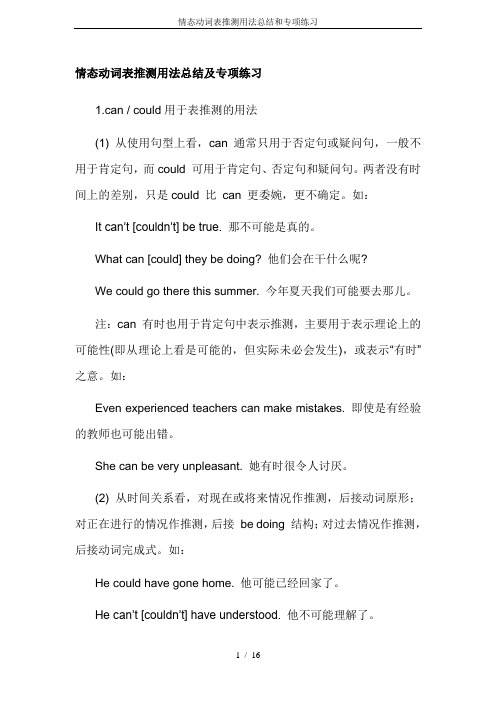
情态动词表推测用法总结及专项练习1.can / could用于表推测的用法(1) 从使用句型上看,can 通常只用于否定句或疑问句,一般不用于肯定句,而could 可用于肯定句、否定句和疑问句。
两者没有时间上的差别,只是could 比can 更委婉,更不确定。
如:It can’t [couldn’t] be true. 那不可能是真的。
What can [could] they be doing? 他们会在干什么呢?We could go there this summer. 今年夏天我们可能要去那儿。
注:can 有时也用于肯定句中表示推测,主要用于表示理论上的可能性(即从理论上看是可能的,但实际未必会发生),或表示“有时”之意。
如:Even experienced teachers can make mistakes. 即使是有经验的教师也可能出错。
She can be very unpleasant. 她有时很令人讨厌。
(2) 从时间关系看,对现在或将来情况作推测,后接动词原形;对正在进行的情况作推测,后接be doing 结构;对过去情况作推测,后接动词完成式。
如:He could have gone home. 他可能已经回家了。
He can’t [couldn’t] have understood. 他不可能理解了。
Why does he know this? Can [Could] someone have told him about it? 他怎么知道? 会是哪个人告诉他了吗?(3) “could+完成式”除表示对过去的推测外,还有以下重要用法:①表示过去没有实现的可能性,常译为“本来可以”。
如:I could have lent you the money.Why didn’t you ask me? 我本来可以借这笔钱给你的。
你为什么不向我提出?②用来委婉地责备某人过去应该做某事而没有去做,常译为“本来应该”。
(完整版)情态动词表推测用法总结及练习(可编辑修改word版)
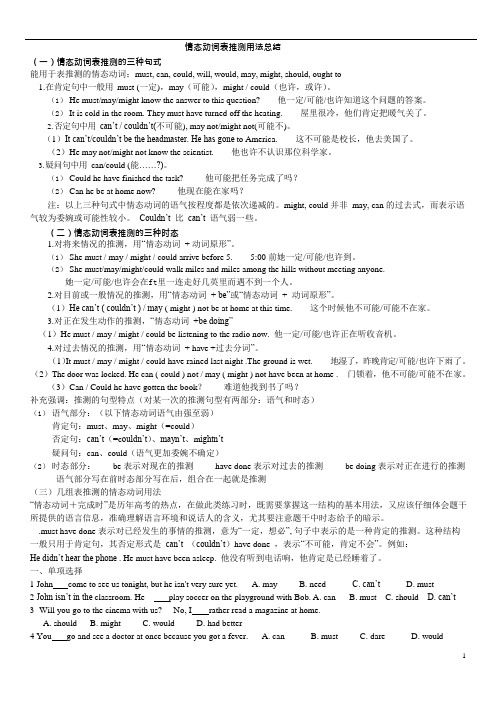
情态动词表推测用法总结(一)情态动词表推测的三种句式能用于表推测的情态动词:must, can, could, will, would, may, might, should, ought to1.在肯定句中一般用must (一定),may(可能),might / could(也许,或许)。
(1)He must/may/might know the answer to this question? 他一定/可能/也许知道这个问题的答案。
(2)It is cold in the room. They must have turned off the heating. 屋里很冷,他们肯定把暖气关了。
2.否定句中用can’t /couldn’t(不可能), may not/might not(可能不)。
(1)It can’t/couldn’t be the headmaster. He has gone to America. 这不可能是校长,他去美国了。
(2)He may not/might not know the scientist. 他也许不认识那位科学家。
3.疑问句中用can/could (能……?)。
(1)Could he have finished the task? 他可能把任务完成了吗?(2)Can he be at home now? 他现在能在家吗?注:以上三种句式中情态动词的语气按程度都是依次递减的。
might, could 并非may, can 的过去式,而表示语气较为委婉或可能性较小。
Couldn’t 比can’t 语气弱一些。
(二)情态动词表推测的三种时态1.对将来情况的推测,用“情态动词+ 动词原形”。
(1)She must / may / might / could arrive before 5. 5:00 前她一定/可能/也许到。
(2)She must/may/might/could walk miles and miles among the hills without meeting anyone.她一定/可能/也许会在ft里一连走好几英里而遇不到一个人。
初中情态动词的用法猜测及练习(经典)
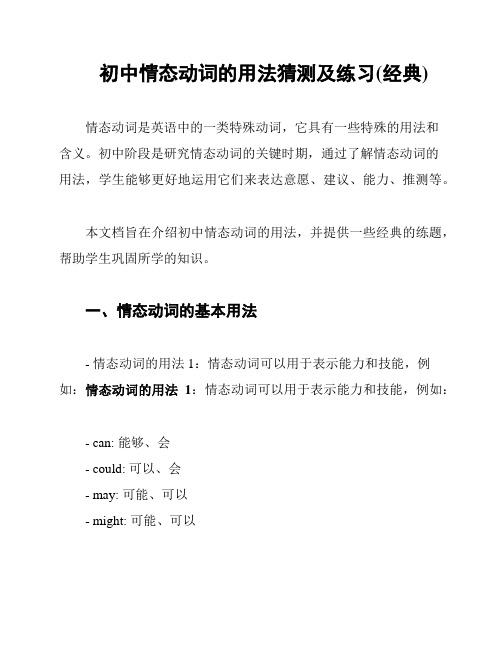
初中情态动词的用法猜测及练习(经典)情态动词是英语中的一类特殊动词,它具有一些特殊的用法和含义。
初中阶段是研究情态动词的关键时期,通过了解情态动词的用法,学生能够更好地运用它们来表达意愿、建议、能力、推测等。
本文档旨在介绍初中情态动词的用法,并提供一些经典的练题,帮助学生巩固所学的知识。
一、情态动词的基本用法- 情态动词的用法1:情态动词可以用于表示能力和技能,例如:情态动词的用法1:情态动词可以用于表示能力和技能,例如:- can: 能够、会- could: 可以、会- may: 可能、可以- might: 可能、可以- 情态动词的用法2:情态动词可以用于表示推测和猜测,例如:情态动词的用法2:情态动词可以用于表示推测和猜测,例如:- must: 必须、一定- should: 应该、应当- ought to: 应该、应当- might: 可能、也许- 情态动词的用法3:情态动词可以用于表示意愿和建议,例如:情态动词的用法3:情态动词可以用于表示意愿和建议,例如:- would: 愿意、将要- should: 应该、应当- ought to: 应该、应当二、练题以下是一些经典的情态动词练题,供学生参考和练:1. 选择合适的情态动词填空:- I __________ go to the party with you, but I have to study for the test tomorrow.- He __________ be a doctor when he grows up.2. 根据语境选择合适的情态动词填空:- A: Can you help me with this math problem?B: Of course! I __________ help you.- A: It's late. We should go home now.B: You're right. We __________ leave.3. 根据句意写出合适的情态动词:- You __________ call your parents and tell them you'll be home late.- I'm not sure, but he __________ be at the library.以上是一些情态动词的用法及练题,学生可以通过不断的练来加深对情态动词的理解和运用。
情态动词表推测的讲解及练习题
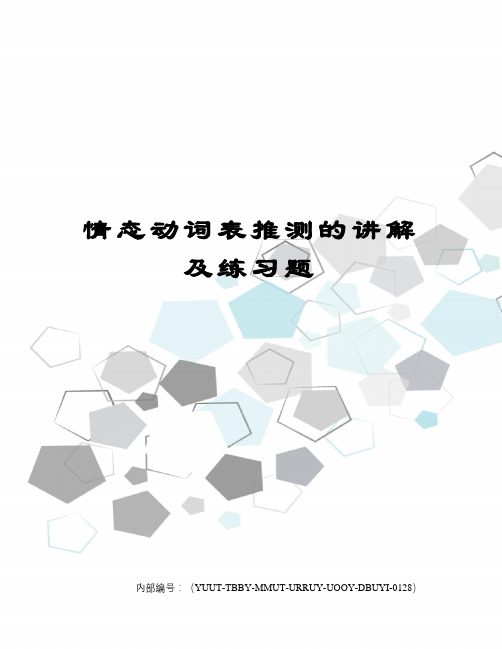
情态动词表推测的讲解及练习题内部编号:(YUUT-TBBY-MMUT-URRUY-UOOY-DBUYI-0128)九年级英语表推测语气的讲解与练习表推测时,英语中只使用must,may,might,may not和can't。
这五个表达的语气依次递减:情态动词must, can, could, may, might表推测的用法情态动词中的must, can, could, may, might都表推测。
其中must的可能性最大,can / could次之,may / might最小。
具体用法如下:的用法(1)表示推测“可能性”时,意思是“一定、准是”,语气较肯定,较有把握。
He must be American. = It is certain that he is American. 他准是个美国人。
(2)must表推测只能用于肯定句。
如果要表示“一定不、肯定不”的意思时,应用can’t,如询问某种可能时,应用can。
He must know my address. 他肯定知道我的地址。
(一定)He can’t know my address. 他肯定不知道我的地址。
(一定不)Can he know my address 他知道我的地址吗(询问可能性)(3)must表示推测时,可以推测现在/正在发生的动作/过去发生的动作。
He must have a car now. (现在)他一定有辆小汽车。
He must be doing his exercises in the classroom.(正在进行)他一定在教室里做练习。
He must have finished the work.(过去发生)他一定已完成了工作。
注:must表示推测时很少用于将来的情况。
一般不用He must come tomorrow.可用It`s certain / I’m sure that he will come tomorrow.(4)在反意疑问句中,当附属部分含有表示推测意义的must时,疑问部分的助动词应与must后面的动词在非推测情况下的用法保持一致。
(完整版)初中情态动词表推测的用法及练习(经典).docx
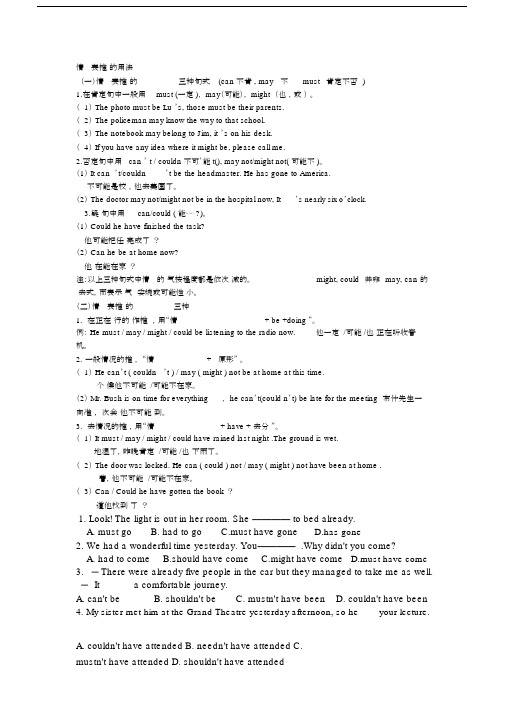
情表推的用法(一)情表推的三种句式(can 不肯 , may不must肯定不否)1.在肯定句中一般用must (一定 ), may(可能), might (也,或)。
(1) The photo must be Lu ’s, those must be their parents.(2) The policeman may know the way to that school.(3) The notebook may belong to Jim, it ’s on his desk.(4) If you have any idea where it might be, please call me.2.否定句中用can ’ t / couldn 不可’能t(), may not/might not( 可能不 )。
(1) It can ’t/couldn’t be the headmaster. He has gone to America.不可能是校,他去美国了。
(2) The doctor may not/might not be in the hospital now, It’s nearly six o’clock.3.疑句中用can/could ( 能⋯⋯ ?)。
(1) Could he have finished the task?他可能把任完成了?(2) Can he be at home now?他在能在家?注:以上三种句式中情的气按程度都是依次减的。
might, could并非may, can的去式,而表示气委婉或可能性小。
(二)情表推的三种1.在正在行的作推,用“情+ be +doing ”。
/可能 /也正在听收音例: He must / may / might / could be listening to the radio now.他一定机。
2.一般情况的推,“情+ 原形”。
初三情态动词表推测
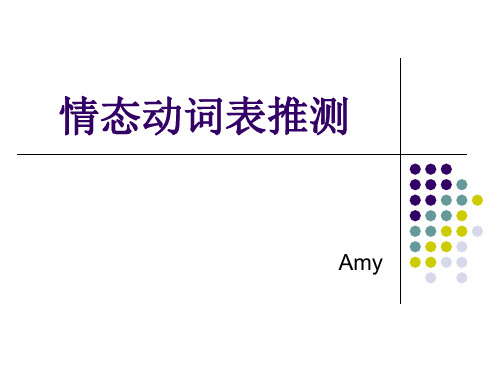
Amy
教学任务:
1.表推测的情态动词 2.表肯定推测的用法 3.表否定推测的用法 4.表不确定性推测的用法 5.情态动词表推测习题
Translate:
He must know the answer. 他一定知道答案。 He can’t know the answer. 他肯定不知道答案
Summer Palace?
— Sorry, I am not sure.It _____ be.
A.might B.will C.must
D.can
2.— Isn’t that Ann’s husband over there?
— No, it _____ be him — I’m sure he doesn’t
wear glasses.
A.can’t
B.must not
C.won’t D.may not
Choose the correct answer.
3.You ____ be tired — you’ve only been working
for an hour.
A.must not B.won’t
C.can’t
D.may not
4.— Is John coming by train?
— He should, but he _____ not.He likes driving
his car.
A.must
B.can
C.need
D.may
Exercises
5.—Mum, Ive signed for the box.What's in it? —I'm not sure.It _____be a present from your
情态动词表推测的讲解及练习2题

情态动词must, can, could, may, might表推测的用法㈠、肯定推测﹕must>can / could>may / might 肯定、可能否定推测﹕can’ t 〉couldn’t 不可能㈡、对三种情况的推测①、对现在状况或动作的推测: must/can / could/may / might/can’t/couldn’t+v原②、对正在进行的动作的推测:must/can / could/may / might/can’t/couldn’t be doing.....③、对过去发生的动作的推测:must/can / could/may / might/can’t/couldn’t have done....㈢、情态动词must, can, could, may, might表推测时的反意疑问句:根据情态动词后的词而定,有last night/yesterday/ago 时,视为过去式①、He must be a worker, isn’t he? (现在)他准是个工人,是吗?②、It must have rained last night, didn’t it? (过去)昨晚一定下雨了,是不是?③、You must have learned English for many years, haven’t you? (完成时)你一定学了好多年英语,是吗?④、He can’t be a teacher, is he? 他不是教师,是吗?⑤、She can’t have finished her homework, has she? 她一定没有完成家庭作业,是不是?㈣、用法⑪、①、He must be American. = It is certain that he is American. 他准是个美国人。
②、He must know my address. 他肯定知道我的地址。
初中英语-情态动词表示推测的用法及专项练习

情态动词must, can, could, may, might表推测的用法:1.用于肯定的推测:must > can > could > may > might1)其中must语气最强最肯定,只用于肯定句,意为“一定,准是,必然会”。
You haven’t eaten anything since this morning,you must be hungry.2) can次之一般表示理论上可能性,但实际未必会发生。
意为“可能”。
Even experienced teachers can make mistakes.3) could再次之,意为“可能”My book has disappeared. Who could have taken it?4) may / might语气最弱,表示无把握的推测,意为“可能,或许”。
(might比may 更加不肯定,更无把握)。
例如:He may/might be writing a letter now, but I’m not sure.2. 用于否定的推测can’t >couldn’t > may not > might not1)can’t用于否定推测,是语气最强的否定推测,意为“不可能,一定不(是)”。
He can’t her here because she is in hospital.2)couldn’t 比can’t 语气弱,表示某事不可能真实,但自己也不是很肯定。
It couldn’t possibly be Tom. He should be at school now.3). may not/ might not表示否定推测时,表示(无把握的)否定推测,意为“可能/或许不”。
例如:It’ still early. He may/might not come back.3.用于疑问句的推测,一般只用can/couldWho can it be at the door? Can it be Tom?情态动词中的must, can, could, may, might都表推测。
初中情态动词表的推测用法猜测及练习(经典)

初中情态动词表的推测用法猜测及练习(经典)在初中语法研究中,情态动词是一个重要的部分。
情态动词除了表示能力、可能性、允许性等含义外,还可用于表达推测。
本篇文档将介绍初中情态动词表的推测用法,并提供一些练。
情态动词表的推测用法猜测情态动词用于推测时,常常表示根据已有的信息或证据得出的合理猜测或推断。
以下是一些常见的情态动词及其推测用法:1. can: 表示推测,例如:"He can be at home."(他可能在家。
)can: 表示推测,例如:"He can be at home."(他可能在家。
)2. could: 表示推测,通常比can稍微更不确定,例如:"She could be busy."(她可能忙。
)could: 表示推测,通常比can稍微更不确定,例如:"She could be busy."(她可能忙。
)3. may/might: 表示推测,表示某种可能性,例如:"It may rain tomorrow."(明天可能会下雨。
)may/might: 表示推测,表示某种可能性,例如:"It may rain tomorrow."(明天可能会下雨。
)4. must: 表示根据已有的证据或情况必然发生的推测,例如:"He must be tired."(他一定很累。
)must: 表示根据已有的证据或情况必然发生的推测,例如:"He must be tired."(他一定很累。
)5. should: 表示合理的推测或建议,例如:"They should be here soon."(他们应该很快就到了。
)should: 表示合理的推测或建议,例如:"They should be here soon."(他们应该很快就到了。
(完整word版)情态动词表推测用法总结和专项练习,文档.doc
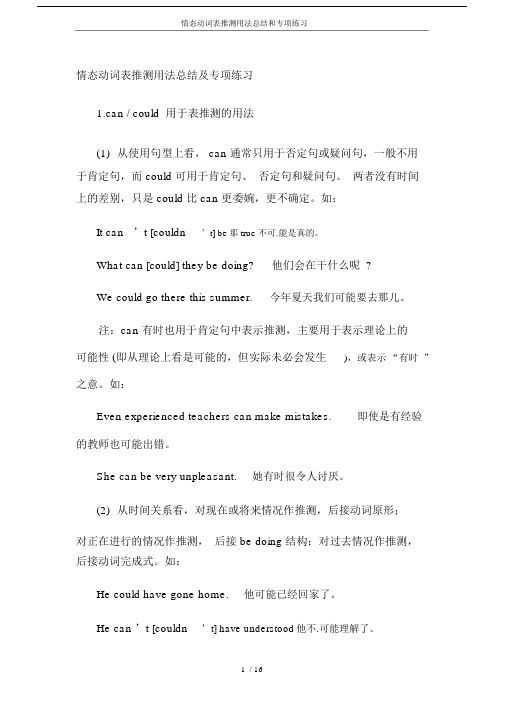
情态动词表推测用法总结和专项练习情态动词表推测用法总结及专项练习1.can / could 用于表推测的用法(1)从使用句型上看, can 通常只用于否定句或疑问句,一般不用于肯定句,而 could 可用于肯定句、否定句和疑问句。
两者没有时间上的差别,只是 could 比 can 更委婉,更不确定。
如:It can’t [couldn’t] be那true不可.能是真的。
What can [could] they be doing?他们会在干什么呢?We could go there this summer.今年夏天我们可能要去那儿。
注:can 有时也用于肯定句中表示推测,主要用于表示理论上的可能性 (即从理论上看是可能的,但实际未必会发生),或表示“有时”之意。
如:Even experienced teachers can make mistakes.即使是有经验的教师也可能出错。
She can be very unpleasant.她有时很令人讨厌。
(2)从时间关系看,对现在或将来情况作推测,后接动词原形;对正在进行的情况作推测,后接 be doing 结构;对过去情况作推测,后接动词完成式。
如:He could have gone home.他可能已经回家了。
He can ’t [couldn’t] have understood他不.可能理解了。
Why does he know this? Can [Could] someone have told him about it?他怎么知道?会是哪个人告诉他了吗?(3)“could+完成式”除表示对过去的推测外,还有以下重要用法:① 表示过去没有实现的可能性,常译为“本来可以”。
如:I could have lent you the money.Why didn’t you ask me?我本来可以借这笔钱给你的。
你为什么不向我提出?② 用来委婉地责备某人过去应该做某事而没有去做,常译为“本来应该”。
推测的情态动词总结及练习含答案高中英语北京海淀
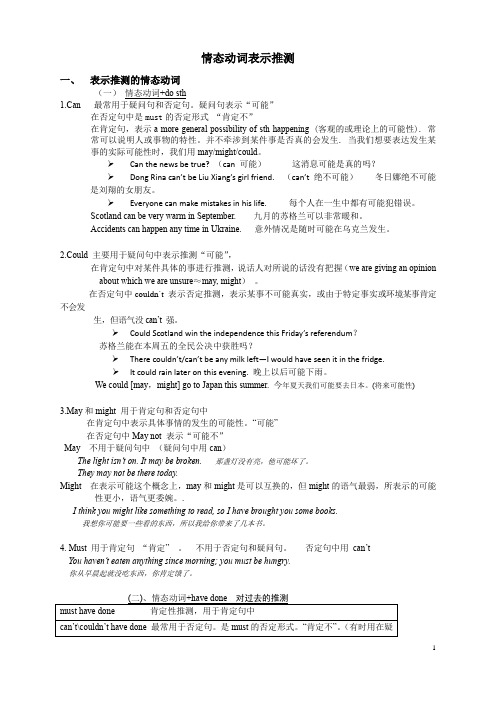
情态动词表示推测一、表示推测的情态动词(一)情态动词+do sth1.Can 最常用于疑问句和否定句。
疑问句表示“可能”在否定句中是must的否定形式“肯定不”在肯定句,表示a more general possibility of sth happening (客观的或理论上的可能性). 常常可以说明人或事物的特性。
并不牵涉到某件事是否真的会发生. 当我们想要表达发生某事的实际可能性时,我们用may/might/could。
➢Can the news be true? (can 可能)这消息可能是真的吗?➢Dong Rina can’t be Liu Xiang’s girl friend. (can’t 绝不可能)冬日娜绝不可能是刘翔的女朋友。
➢Everyone can make mistakes in his life. 每个人在一生中都有可能犯错误。
Scotland can be very warm in September. 九月的苏格兰可以非常暖和。
Accidents can happen any time in Ukraine. 意外情况是随时可能在乌克兰发生。
2.Could 主要用于疑问句中表示推测“可能”,在肯定句中对某件具体的事进行推测,说话人对所说的话没有把握(we are giving an opinionabout which we are unsure≈may, might)。
在否定句中couldn`t 表示否定推测,表示某事不可能真实,或由于特定事实或环境某事肯定不会发生,但语气没can’t 强。
➢Could Scotland win the independence this Friday’s referendum?苏格兰能在本周五的全民公决中获胜吗?➢There couldn’t/can’t be any milk left—I would have seen it in the fridge.➢It could rain later on this evening. 晚上以后可能下雨。
表推测的情态动词用法小结含练习与答案

表推测的情态动词用法小结英语中有不少情态动词都可以表示推测,其语气有强有弱,表示的可能性有大有小,现将它们的用法归纳如下:1. 接近100%的可能这当然只有must才具有这么高的可能性,它的意思是“一定”“肯定”,所作出的推测几乎接近事实。
如:That hat must be Tom’s.那帽子一定是汤姆的。
He must be coming by bus. 他一定是乘公共汽车来。
2. 很有可能表示可能性较大的情态动词主要有may, should, ought to,它们大致相当于汉语的“可能”“应该”“按理会”。
如:She should [ought to] be here soon. 她应该很快就到。
We may be buying a new house. 我们可能要买一座新房子。
3. 一般性的可能在所有表示推测的情态动词中,might和could所表示的可能性最小,由于它们的语气较委婉,较不确定,所以往往相当于汉语的“可能”“也许”“说不定”等。
如:He might be waiting for you. 他可能在等你。
We could all be millionaires one day. 我们有一天可能都成为百万富翁。
4. 理论上的可能性表示理论上的可能通常是用can,且可以用于肯定句中。
如:Food poisoning can cause death. 食物中毒可导致死亡。
This kind of thing can happen every now and then. 这种事情是随时可能发生的。
所谓理论上的可能性,就是指仅从理论上去考虑其可能性,至于实际情况如何,则不作考虑,比如说“食物中毒可导致死亡”,这只是理论上的一种推断,至于某人某次食物中毒了,他是否会死亡,则不在考虑之列,所以说,这种推测是非常“宏观”的!5. 表示对过去情况作推测如果表示对已经发生的情况作推测,不能用“情态动词+动词原形”,也不能用“情态动词的过去式+动词原形”,而是要使用“情态动词+动词完成式”。
初中情态动词表的用法推测及练习(经典)

初中情态动词表的用法推测及练习(经典)本文档旨在提供初中学生关于情态动词用法推测及练方面的指导。
下方是一份经典的初中情态动词表,供学生参考和练。
用法推测Can / Could- 表示能力或可能性:He [can/could] swim very fast. (他会游泳很快。
)- 表示请求或允许:[Can/Could] you help me with the homework? (你能帮我做作业吗?)May / Might- 表示可能性或允许:We [may/might] go to the ___(我们明天可能去公园。
)- 表示推测或建议:He [may/might] be late for the meeting. (他可能会迟到开会。
)___- 表示将来的行为:I [shall/should] ___我这个周末会去看望我祖父母。
)- 表示义务或建议:You [should] study hard for the exam. (你应该为考试而努力研究。
)Will / Would- 表示将来的行动或意愿:He [will/would] buy a new car. (他想买一辆新车。
)- 表示请求或邀请:[Will/Would] you please pass me the salt? (请你把盐递给我好吗?)Must- 表示必须性或推测:I [must] ___ before going out. (我必须在出门之前完成作业。
)- 表示肯定的推测:He [must] be tired after running for so long. (他跑了这么久肯定累了。
)___- 表示应该或建议:You [ought to] apologize to your friend. (你应该向你的朋友道歉。
)练根据上述情态动词的用法推测,完成以下句子:1. I __________ swim when I was five years old. (我五岁的时候能游泳。
情态动词表推测的讲解及练习题讲课稿

表推测时,英语中只使用must,may,might,may not和can't。
这五个表达的语气依次递减:must:一定(语气肯定)可能性最大may might ;can could 可能不确定可能性不大may not:也许不(表否定)can't:一定不;不可能(must的反义)可能性为零推测现在的事情用must,may,might,may not和can't+do或bee.g.She must be at home now. The boy may play now.推测过去的事情用must,may,might,may not和can't+have donee.g.She might have been ill yesterday. He must have hold the party.情态动词must, can, could, may, might表推测的用法情态动词中的must, can, could, may, might都表推测。
其中must的可能性最大,can / could 次之,may / might最小。
具体用法如下:1.must的用法(1)表示推测“可能性”时,意思是“一定、准是”,语气较肯定,较有把握。
He must be American. = It is certain that he is American. 他准是个美国人。
(2)must表推测只能用于肯定句。
如果要表示“一定不、肯定不”的意思时,应用can’t,如询问某种可能时,应用can。
He must know my address. 他肯定知道我的地址。
(一定)He can’t know my address. 他肯定不知道我的地址。
(一定不)Can he know my address? 他知道我的地址吗?(询问可能性)(3)must表示推测时,可以推测现在/正在发生的动作/过去发生的动作。
(2021年整理)情态动词表推测用法总结及专项练习
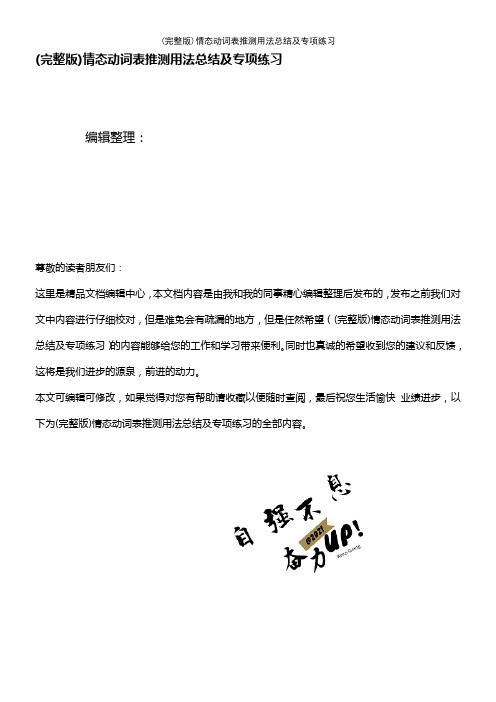
(完整版)情态动词表推测用法总结及专项练习编辑整理:尊敬的读者朋友们:这里是精品文档编辑中心,本文档内容是由我和我的同事精心编辑整理后发布的,发布之前我们对文中内容进行仔细校对,但是难免会有疏漏的地方,但是任然希望((完整版)情态动词表推测用法总结及专项练习)的内容能够给您的工作和学习带来便利。
同时也真诚的希望收到您的建议和反馈,这将是我们进步的源泉,前进的动力。
本文可编辑可修改,如果觉得对您有帮助请收藏以便随时查阅,最后祝您生活愉快业绩进步,以下为(完整版)情态动词表推测用法总结及专项练习的全部内容。
(完整版)情态动词表推测用法总结及专项练习编辑整理:张嬗雒老师尊敬的读者朋友们:这里是精品文档编辑中心,本文档内容是由我和我的同事精心编辑整理后发布到文库,发布之前我们对文中内容进行仔细校对,但是难免会有疏漏的地方,但是我们任然希望 (完整版)情态动词表推测用法总结及专项练习这篇文档能够给您的工作和学习带来便利。
同时我们也真诚的希望收到您的建议和反馈到下面的留言区,这将是我们进步的源泉,前进的动力.本文可编辑可修改,如果觉得对您有帮助请下载收藏以便随时查阅,最后祝您生活愉快业绩进步,以下为 <(完整版)情态动词表推测用法总结及专项练习〉这篇文档的全部内容.情态动词表推测用法总结及专项练习1.can / could用于表推测的用法(1)从使用句型上看,can 通常只用于否定句或疑问句,一般不用于肯定句,而could 可用于肯定句、否定句和疑问句。
两者没有时间上的差别,只是could 比 can 更委婉,更不确定.如:It can’t [couldn’t] be true. 那不可能是真的。
What can [could] they be doing?他们会在干什么呢?We could go there this summer. 今年夏天我们可能要去那儿。
注:can 有时也用于肯定句中表示推测,主要用于表示理论上的可能性(即从理论上看是可能的,但实际未必会发生),或表示“有时”之意.如:Even experienced teachers can make mistakes。
- 1、下载文档前请自行甄别文档内容的完整性,平台不提供额外的编辑、内容补充、找答案等附加服务。
- 2、"仅部分预览"的文档,不可在线预览部分如存在完整性等问题,可反馈申请退款(可完整预览的文档不适用该条件!)。
- 3、如文档侵犯您的权益,请联系客服反馈,我们会尽快为您处理(人工客服工作时间:9:00-18:30)。
情态动词must, can, could, may, might表推测的用法情态动词中的must, can, could, may, might都表推测。
其中must的可能性最大,can / could 次之,may / might最小。
具体用法如下:1.must的用法(1)表示推测“可能性”时,意思是“一定、准是”,语气较肯定,较有把握。
He must be American. = It is certain that he is American. 他准是个美国人。
(2)must表推测只能用于肯定句。
如果要表示“一定不、肯定不”的意思时,应用can’t,如询问某种可能时,应用can。
He must know my address. 他肯定知道我的地址。
(一定)He can’t know my address. 他肯定不知道我的地址。
(一定不)Can he know my address? 他知道我的地址吗?(询问可能性)(3)must表示推测时,可以推测现在/正在发生的动作/过去发生的动作。
He must have a car now. (现在)他一定有辆小汽车。
He must be doing his exercises in the classroom.(正在进行)他一定在教室里做练习。
He must have finished the work.(过去发生)他一定已完成了工作。
注:must表示推测时很少用于将来的情况。
一般不用He must come tomorrow.可用It`s certain / I’m sure that he will come tomorrow.(4)在反意疑问句中,当附属部分含有表示推测意义的must时,疑问部分的助动词应与must后面的动词在非推测情况下的用法保持一致。
He must be a worker, isn’t he? (现在)他准时个工人,是吗?It must have rained last night, didn’t it? (过去)昨晚一定下雨了,是不是?You must have learned English for many years, haven’t you? (完成时)你一定学了好多年英语,是吗?2.?can / could的用法(1)can表示推测“可能性”时,往往用于否定句或疑问句。
Can’t“一定不”,语气很肯定。
can在疑问句中意思是“会、可能”。
He can’t be at home. = It is impossible that he is at home. 他一定不在家。
(2)can /can’t后可接进行时/完成时,表示对现在发生的动作或过去发生的动作进行推测。
They can’t be reading in the library. 他们一定不在图书馆读书。
He can’t have gone to Shanghai for I saw him a minute ago.他不可能去了上海,我刚才还看见他。
It’s so late. Where can she have gone? 天晚了,她可能去哪儿了呢?(3)在反意疑问句中,当陈述部分含有表示推测意义的can’t时,疑问部分的助动词应与can’t后面的动词在非推测情况下的用法保持一致.He can’t be a teacher, is he? 他不是教师,是吗?She can’t have finished her homework, has she?她一定没有完成家庭作业,是不是?(4)could可用于表示某事有可能发生或可能是事实。
Don’t eat it. It could be poisonous. 不要吃它,可能有毒。
The plane could be delayed by fog. 飞机可能会因为雾晚点。
(5)could还可以用于表示客气、委婉、礼貌的请求语气。
Excuse me, could you tell me the way to the bus station?Could you help me?(6)couldn’t表示否定推测,表示某事不可能真实,或由于特定事实或环境某事肯定不会发生。
It couldn’t possibly be poison. 这不可能是毒药。
注:有时与形容词的比较级连用强调某人或某物不可能再更多地具有某种属性。
You couldn’t be more wrong. 你真是大错特错。
I couldn’t be happier. 我简直是幸福极了。
3. may和might的用法(1)may, might表示推测“可能性”时,意思是“可能”、“也许”,语气没有must肯定。
He may / might be American. = It is possible that he is American.他可能是个美国人。
注:might不表示过去时态,只是语气上比may更委婉,表示的可能性更小。
(2)may, might表推测时,可以用于否定句,意思是“可能不、也许不”,但不用于疑问句。
He may / might not be at home. 他也许不在家。
(3)may, might可以推测现在正在发生的动作或过去发生的动作。
He may / might be sleeping now. (现在)他可能正在睡觉。
The boy may / might not be watching TV at home. (现在)这个男孩可能没在家看电视These students may / might have seen the film before.(过去)这些学生以前可能看过这部电影。
(4)may, might还可以推测将来的情况。
I think we should take raincoat with us, it may rain.我想我们应该带上雨衣,可能要下雨了。
She might not come this afternoon. 她今天下午可能不来一、单项选择1 John___ come to see us tonight, but he isn't very sure yet.A. mayB. needC. can’tD. must2 John isn’t in the classroom. He play soccer on the playground with Bob.A. canB. mustC. shouldD. can’t3 -Will you go to the cinema with us?-No, I rather read a magazine at home.A. shouldB. mightC. wouldD. had better4 You___ go and see a doctor at once because you got a fever.A. canB. mustC. dareD. would5 -Can you speak Japanese? -No, I____.A. mustn'tB. can'tC. needn'tD. may not6 -He___ be in the classroom, I think.-No, he ___ be in the classroom. I saw him go home a minute ago.A.can; may notB. must; may notC. may; can'tD. may; mustn't7 -Is Lena swimming in the pool?-No, she swim. She is terrified of water.A. may notB. must notC. can'tD. needn't8 He isn't at school. I think he ___ be ill.A. canB. shallC. mustD. might9 -What do you think “upset” means?- I’m not sure. It mean “sad”.A.mayB. mustC. canD. should10 The children___ play football on the road.A. can'tB. canC. mustn'tD. must二、根据句子意思用must, might, could或can’t填空1. The white ruler belong to Lucy. Hers is red.2. I can’t find my keys. They be still at home.3. The exercise book belong to Bob. It has his name on it.4. Jim be at home. He has gone to his hometown.5. This blue shirt belong to Ken. He likes blue best.6. The schoolbag be Paul’s. There are a lot of books in it.7. The volleyball belong to Alice. She plays volleyball every day.8. The classroom is clean. Someone clean it just now.9. –Is that Bob there?–No, it be him. He has gone to Shanghai with his family10. –where is Mr. Lee?–The light in his bedroom is still on. He be there.11. I find my pencil case. I think I have lost it.12. The boy is clever. He tell many stories when he was young.13. The man is running fast. He be catching the bus.14. Li Lei has learned English for 15 years. He know the meaning of this sentence.15. –What are you going to do this weekend ?–I’m not sure. I visit my grandparents.16. –Who is that boy in blue?–It be Tim. He is always reading English there every morning.–It be him. He is talking with Miss Liu in the classroom.17. I thought you __________ be hungry, so I have brought you some cakes.18. -Here are some earrings. The owner ______ be a boy.-Well, it _______ be a boy. The earrings ______ be a present for his mother.19.-Are you coming to Jeff’s party?-I’m not sure. I go to the concert instead20. I have tried to call him at the office, but there is no reply. He be at home.三、根据所给汉语提示完成句子。
